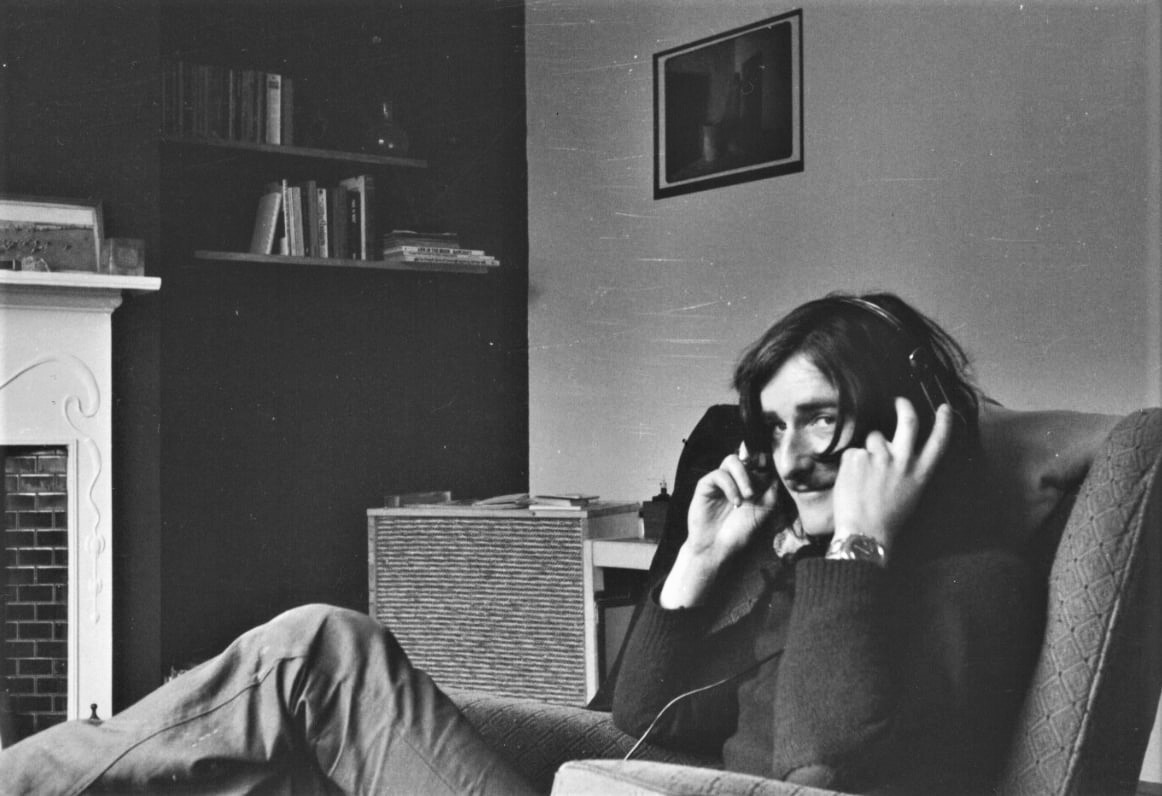Sandy Davis | Gracious | Interview
Sandy Davis is an English musician having a career span of over 50 years. Sandy started his career as Paul Davis in 1967 when he formed progressive rock band Gracious, they released two studio albums and disbanded in 1971.
From then, Paul became Sandy as he embarked on a solo career playing and working with musicians like Paul Travis, Mike Read, Doug Ferguson, Peter Skellern and Frank Farian.
Joe Smith: So, the first Gracious album, Martin Kitcat used the harpsichord, was there any influence behind the harpsichord or is it just the classical style of him or the classical stale of the band?
Sandy Davis: Well, the harpsichord was near to him because he had been trained classically and I guess that is one of the key instruments that you know you get trained on or with. But we just liked the sound, well obviously we were undifferenced by the different sounds of the time and you know, and other bands were still using new sounds as it were so that’s where that came from, I think.
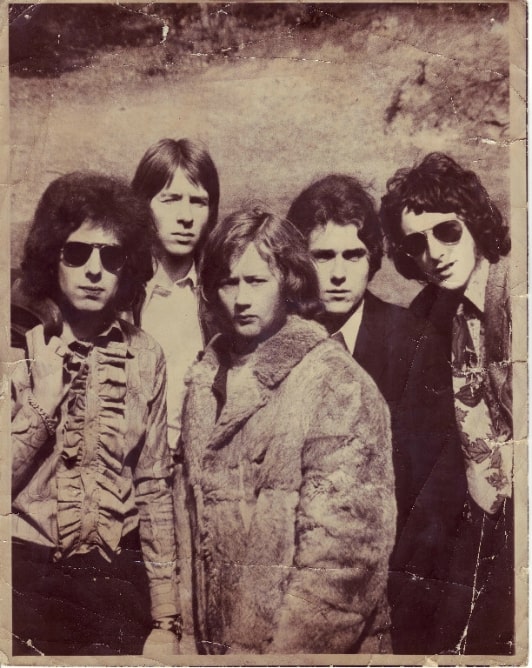
And how did you take the harpsichord on touring and stuff like that because you had songs like, ‘Introduction’ where it was kind of needed and ‘Fugue In ‘D’ Minor’, I don’t know if you played that live but, that was the key instrument in it.
Sandy Davis: Well, it was a combination of the two. We didn’t take a harpsichord with us, we had mostly the mellotron and in the early days we had a e piano, an electric piano, a Hohner I think which we kind of, you know, sort of converted the sound a little bit, took off some bass and put some more mids in to make it sort of more like a harpsichord. There were these things available in 1969/1970. Also, we had foot pedals and stuff you know to give it that sort of feel and later when we got a mellotron I think the harpsichord sound was in the mellotron but don’t quote me on that one. But, if it was at all impossible, you know you just couldn’t recreate, like you just said in the ‘Introduction’, then we didn’t play it.
You didn’t play it. Alright, cause that is kind of one of your most popular songs.
Sandy Davis: Yes, I mean we are going back now a few years. I think we played about 50/55 years so, my memory is not as brilliant as it used to be. But we tried to play everything that we could know, and if it was not possible then it was a 5-guy decision, you would just say to them, shall we, and keyboard Martin would say, well I can’t do it, so you know. Therefore, we wouldn’t play it. So, you know, that is how that one would have gone.
And what was your writing relationship with Martin like, your kind of pop style meets his classical style, and it is interesting to see how that blends?
Sandy Davis: Yeah, well I mean, I grew up with the Beatles and I was lucky enough to be right in the middle of that when the Beatles were top of the musical world really and still are. To be honest, they have achieved that status up there and the rest are down here where it stands where it all starts. But anyway, what was the question again?
What was your writing relationship with him like because you had kind of a pop style and all these pop influences and I guess he did too, but he also had the classical stale and all the classical influences and how did that…?
Sandy Davis: Oh right, that is right. That’s where we got the Beatles from then. Well, it was a production, a combination. Martin and I worked very well, I had lots of words and phrases which obviously came in from the era I’d picked up and used and worked on, and Martin had his kind of you know, classical training and was rearing to go. I probably would have said, well we will try an F-sharp, E-minor to an F-sharp major is quite sort of a new thing really and he probably would have played a little riff. I would have come up with some phrase I would have had in my head and we would have, if we thought the phrase was good, well we would have then changed the melody a little bit. But the relationship was very active I would say, and didn’t have much of a social life, the two of us went his own way and did his own thing. But when it came to practicing and writing, we were very busy doing those things.
Is this the same kind of relationship you would have with Paul Travis in 1975 onwards?
Sandy Davis: Similar, it was not the same. Paul was a very gifted finger picking acoustic guitar player, I was more of a strumming type. I would provide the backing to his soloistic kind of feel. The relationship while it was similar, it was different. We were friends with you know, somebody and somebody else. They are both friendships, but they are different kinds of… you know, they are different. So, I would say it is comparable yes, but Paul was very, more dominant than Martin. Martin was more like have you got anything new, any ideas? And Paul would say, hey listen, I have got this tune here you know which we can work on. So, there are two different scenarios that are separate sorts of ways of working.
And did you have a lot of control over something like the drums as your history with the first drummer of the band Satan’s Staples, did you have a lot of control over the drums as writing?
Sandy Davis: Well, control as far as that word goes, yes. I mean I did tell Robert what we wanted, and you know, how I envisage or how me and Martin envisage/pictured how the track should go and I do remember in a very very friendly way telling Robert not to make it so complicated. So, I was kind of more on that sort of you know, keeping the beat, and Rob was very, not bad, he did a great job Rob, he played the drums like an instrument and that is how it should have been played. He did a great job; I have to say.
I have read for the second Gracious album, that it was more of a not to say that the first album is just you and Martin having complete input, but the second album was more of a group input where Tim would edit some little bass parts here and there and Robert, he said he had more freedom with the drums. What do you think about that?
Sandy Davis: Well, I agree with him. The first album was kind of stricter. We just finished touring for the umpteenth time and when the studio asked to do the first, almost obligatory album which is great, we had this contract, and it was disciplined. It was disciplined because of the budget. You know, the record company says okay we’ll make another album, but you know you only have x thousand pounds so use it wisely boys. We had a producer Hugh Murphy who went on to produce that world hit ‘Baker Street’ with Gerry Rafferty and Hugh was really, really good at this, very easy going but disciplined and so yeah, I guess the second album was more… was freer because we needed a follow up to the first album and I guess there was more freedom there. Like natural progression really, when you are making your first performance with people, you tend to be absolutely correct and the second time you do it you know, everybody else is confident. It is an indescribable kind of feeling. So, that would explain that I think.
Is it true that the first album was just recorded sort of in complete takes and then overdubbed after? Was that stressful?
Sandy Davis: Well, it was kind of stressful since it was really our first recording experience you know. There are 4 other people plus the producer around you so, you know you have got to be just playing and thinking about creative aspects and make this sort of a bit better, and I didn’t really like singing because of overspill. You know, you’ve got the drums and studios were not as they are today. It was pretty basic stuff in drums and bass and that kind of thing. So, there was overspill from the drums onto the base track and that is directly injected into the mix. Even the microphone, so I like to sing it later. I learned a lot actually on those sessions, like how not to sing and the things to do and not to do. It was a very valuable time in the recording studio.
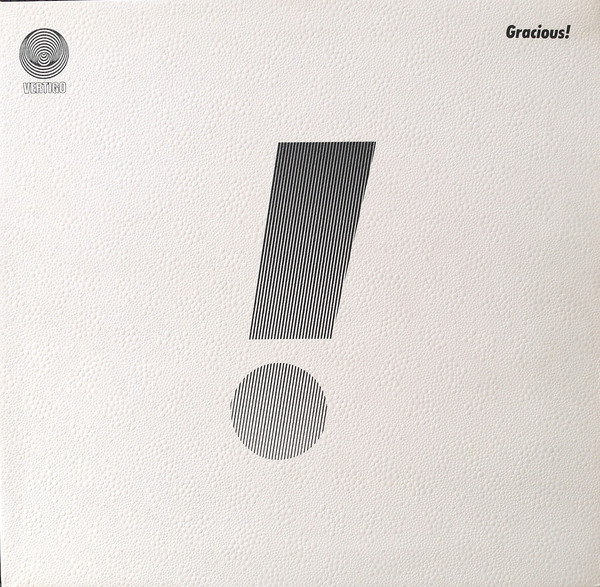
How did you feel about your singing on those albums because I have read a lot of unneeded sort of criticism towards the singing being felt out of place at times but… how do you feel about your singing in those albums?
Sandy Davis: Well, what should I say about my own performance. It is difficult to say, there are some things that I would have sung differently looking back and some other performances that I am proud of. But I have always been one for how we could make that better. I am not one for saying that is it, I can’t do any better, it is great as it is. I have never been like that and I guess I never will be. I always look for improvements but, that doesn’t mean to say that I am not happy with what has been decided otherwise my life would have been frustrating and I would have been disappointed every time. But you know how it is, you tend to be more critical of yourself. I think until you get to that point where you think alright, it’s okay, you did good so. I would say 50/50, yes there are some things I could have done better but in general I am happy with the way it turned out.
Do you remember the “Hey You” kind of little bit in ‘the Dream’ because I have read every review and they all loved that?
Sandy Davis: What was it again?
“The Hey You” in ‘the Dream’.
Sandy Davis: “Hey You”…
You just scream “Hey You” and then start singing a little bit of ‘Hey Jude’ by the Beatles.
Sandy Davis: Did I really? Wow. Seriously, how long ago that was. I can’t remember that to be honest but that would have been typical of me. I was never really one for being disciplined, I had enough of that being at school and you know, to have something like that on tape sounds like me. If we got away with it in the end, then okay.
As you mentioned earlier, the second Gracious album, a lot more of a free pop-rock style, is that what you kind of prefer? I know the first album is good for being instrumental and the second album is better for being free and loose but which kind of sound do you prefer?
Sandy Davis: I would say the combination of the two would be… I know that sounds like a pretty boring thing to say but it isn’t cause we have showed that on the first album, the instrumental side of the band if you like and the descriptive qualities that we could reach in our writing and I think we have made a pretty good job of that, very happy when I listen to it back again. On the second album it was as we discussed, more open and more kind of like a band participation, like what do you think and… whereas the first album was listen we have this bassline, it goes like this and can we do that and the second album was more, whatever you think and that is really sort of how it all turned out. I love them both really. They both have got their strong and weak points like everything in life.
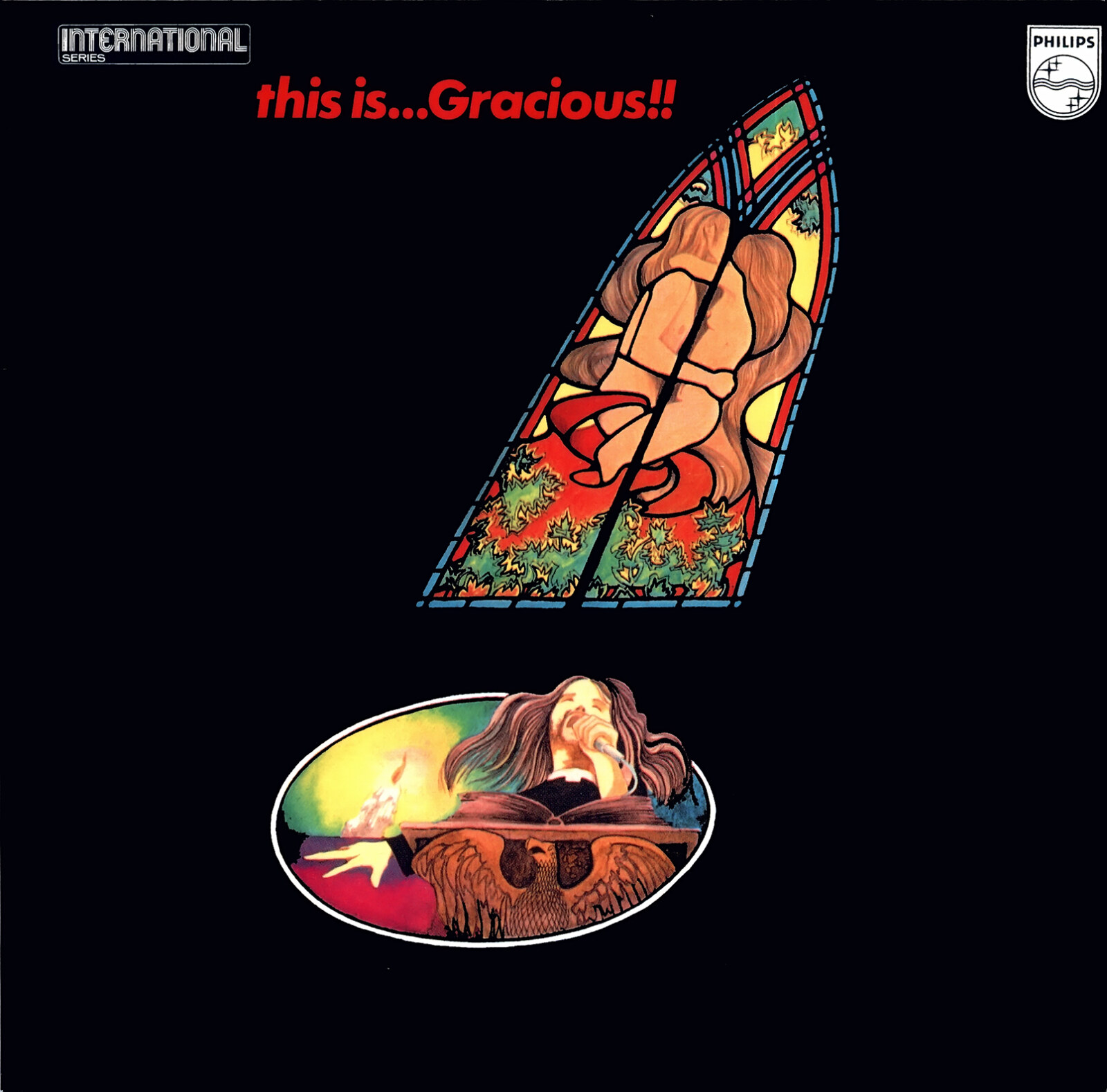
So, when Gracious eventually fell apart with Robert leaving and then Martin leaving, was it a hard decision to go and do the solo career after seeing your band fall apart?
Sandy Davis: Well, it sort of happened in a very casual and not in any way forced situation. When the band fell apart, if we had somebody there that would have paid us all a living wage then things could have turned out differently but that wasn’t the case and I just went back home and started writing songs. You know, just pop songs really, nothing fancy, no sort of 7/4 timings or a bar of 5 and a bar of 3 or whatever you want you know. That was in fact a sort of attitude that we had with Gracious. Sometimes we were trying to be as complicated as possible and sometimes as casual as possible. You know how the attitudes follow in pop-rock days. “Yes” is a typical example of that actually, so I just wrote a lot of songs when things came into my mind you know, silly things, interesting things, songs influenced by Ham and a little line taken from there and I ended up with a demo tape of I don’t know, 19/20 songs which I sent to Alan Cowderoy, a guitarist in Gracious who was working then in that time in the music business and had connections to maybe management but to record companies, managers, people who may be able to use the songs to put me on a contract of some sort and that is how it all started. Alan pointed me in the direction of the certain Johnny Sterling who became very very instrumental in record contracts and publishing deals for me.
And it was around this time you changed names from Paul to Sandy, was this a personal preference or was it management telling you to change your name or something like that?
Sandy Davis: Well, no it was because there was American artist caul Paul Davis, same spelling and if you look on google, then his name will come up. I don’t think he is active anymore, but he was active at the time and I thought well, today of course it wouldn’t matter, you have got 10 people called Eric it doesn’t matter at all but in those days, I just thought well everyone calls me Sandy, Sandy Davis. That sounds pretty cool, let’s use that. I will use that and then don’t have any contractual problems, or you know, anything like that and that’s how that started.
On Discogs, I have seen a “Sandy Davies”, is there any story behind that?
Sandy: There is no… it may be a misspelling but I doubt it somehow, Discogs is pretty correct in what they are advertising so, yeah. No connection.
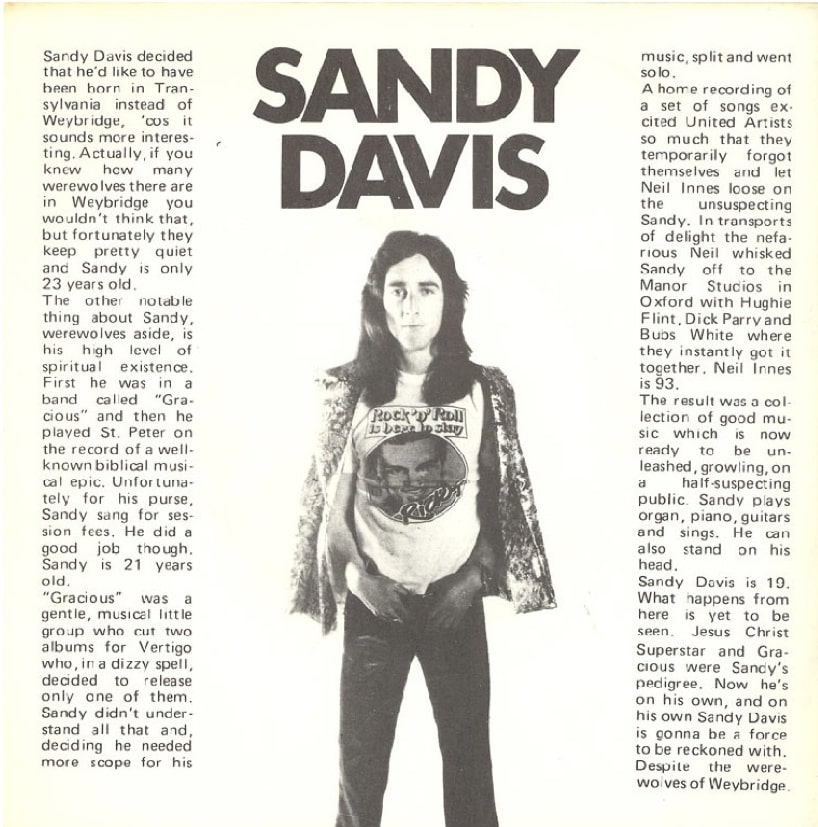
As you got your first record deal, did you have as you mentioned, you had like 20 or so demo recordings, did you have other songs ready to record or are you just good at sitting down and just writing songs or did these ideas come to you over time?
Sandy Davis: Well, the ideas came to me over time. It was about, after the band had broken up, I think it was early 1970. I am not quite sure, but I think it was early 1970 and Gracious broke up. It was obviously pretty traumatic but very disappointing and I just went back home and had a little demo studio, what a demo studio in those days was a tape recorder and a cheap old microphone you know. That is all you had, I mean some of John Lennon’s remarks are that… in fact I went to his house and saw some of the equipment that he had. Nothing more, it was not fancy, and I just used that, and I wrote as many things as I could. Backing tracked the voice and you know, made it sound as big as I could with the instruments that I had. Not sure if there was a click track machine or a drum machine. I have a feeling there wasn’t. I have a feeling I made all of the drums, the timing from tapping the guitar, you know you can do that and that is how I did it. I didn’t have any fancy equipment. Like I said, I put together maybe 20 songs or maybe more, then I thought it was a good idea… Oh I forgot this, do you know a character called Neil Innes? He used to be with the Bonzo Dog Doo-Dah Band’. Silly name but quite amusing but Neil was a composer and a guitar player of this band and he was also in ‘Magical Mystery Tour’ from the Beatles and he had kind of established himself as a producer if you like. He left the Bonzo band, and he was living this kind of producer life in South London and I went to meet him. Somebody connected me to him, and he said, oh come on over and I did. We went to the Manor Studios in Oxford. The very first business thing of Richard Branson. He had a recording studio, the man in Oxford and that is where we were. We recorded loads of tracks up there, but it didn’t really turn out to be in the thing because Neil was as talented as he was and as funny and charming and really really nice bloke, a really nice bloke. The combination of me and him was not going to work. We had a lot of fun I mean, really a lot of fun but the tracks didn’t come out as we kind of planned so they got shelved and then, you know, the first LP got thrown in Stirling’s interest and he brought me to EMI.
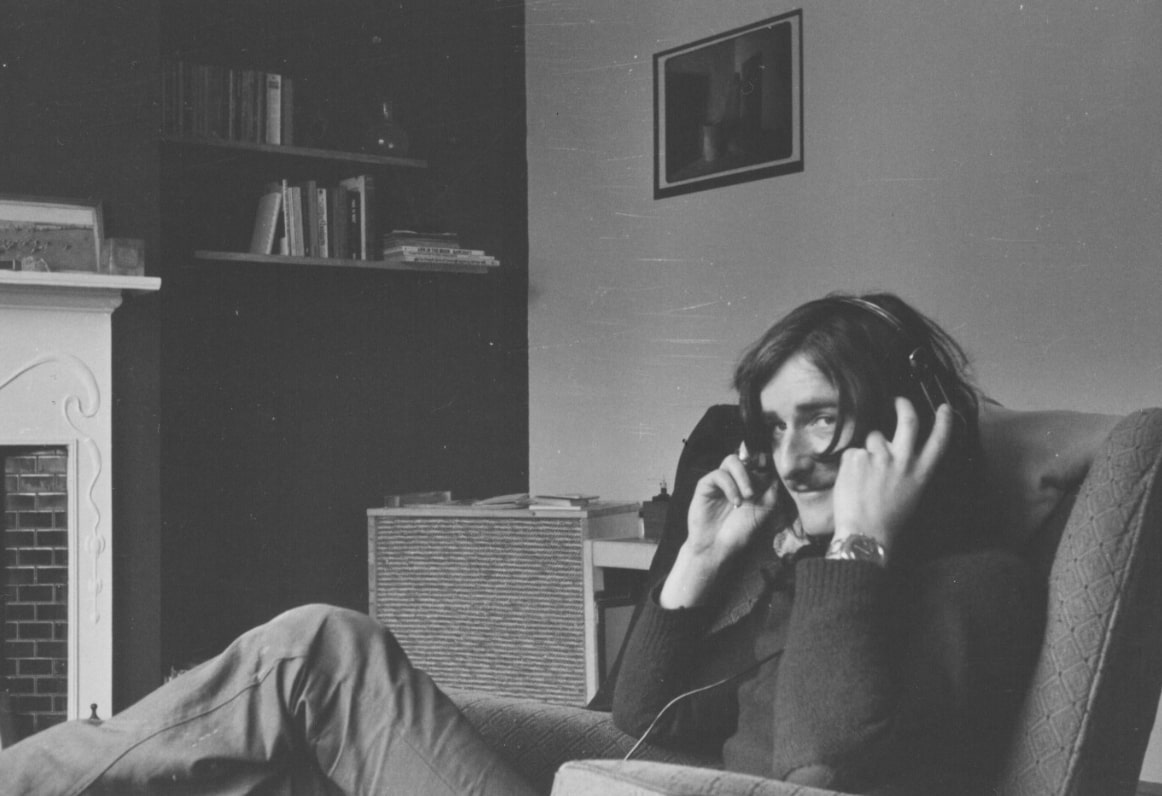
‘Inside Every Fat Man’ album has some undisputed credits for the bass. The album credits you for bass, but you’ve said yourself that Chris Squire played some bass although I have heard Martin Briley played some bass, I have heard Tim Wheatley played some bass on that album as well. Can you tell me is it all those names that played bass yeah?
Sandy Davis: Yes, I am pretty shocked because bass has never been my instrument, I mean, I fumble along in a kind of amateur fashion. I mean if you have got people from… like they were at Morgan Studios recorded in North London, you know if you have got them fiddling around on the controls, obviously we then better drop them, and the end track would sound half professional even if you were a plonker. Bass was never really my thing, I never really liked it to be honest so yes, it would be Chris Squire that played on 1 or 2 tracks actually. That is always the fast pace kind of, so you can hear it, it is Chris by sound. He was brilliant and the brother of the recording engineer was Greg Jackman, the brother Andrew arranged it. We did it together and yeah, I played a lot of instruments from a click track. That famous click, you know playing the piano, just going through the chords, no vocals, just going through the chords. There had been an acoustic guitar and then bought in the other guys to play as an overdub, you know the instrument. So, that is how that album was basically made. It was made as a demo in a proper recording studio. Not as a demo, that would be wrong to say, it was made as a master but as you would imagine a demo to be made these days. Playing the instruments, yourself and fiddling around. It turned out really great and I was really really happy with that.
I’m looking at it now, it says it was recorded from May-November, and it was all on click track or however you say. Was it a stressful kind of moulding all the tracks together or was it completely fine and all that?
Sandy Davis: No, well, I made up a whole bunch of stuff in the studio of course. I mean I knew my way around a piano, no piano lessons, no professional couldn’t read music, still can’t, just kind of from instinct that oh this is the chord C right, so if you want to make it then you have to do this, and they were patient with me. It didn’t take 3 days to put a piano sequence on, it didn’t take that long, but it took some time and Greg behind the mixing desk was brilliant. He would use all the tricks and sometimes we would click track and I would sing, I would put a guitar on just something in the background and then just singing for my demo voice and then we would start working on the piano track and get Chris Squire in for the bass and get creative because he was recording with Yes and one of the other studios. So, that is how we made it, that is how the record got made. It was a really super recording experience, really great.

Do you remember what tracks you played bass on or what tracks Tim Wheatley played bass on?
Sandy Davis: Oh, I can’t now, I don’t think… it might just… see what the tracks are. So, I have got the title of the tracks up here. Probably… I played bass on ‘Inside Every Fat Man’, ‘I Got Friends’, ‘Rocker Box Man’ certainly not that was far too fast. ‘Show a Little Love’, I am not sure. Maybe ‘Snuggle Up’ I played bass, but I don’t know, Tim could have been… It is all the way back now. ‘Up High’, I didn’t play bass on that, that was a recording engineer that played bass and that we included on the album because it just turned out the way that it did, and we thought it was great. Then we have ‘Sunny Day’, ‘My Favourite Lady’, that was more session guys, that wasn’t Chris Squire. It was more… we got a professional bass player in there or it could have been Tim. I don’t know. Last to ‘Last of my Goodbyes’, ‘Lend me a Fiver’, it is difficult for me to say, you know, on the less complicated tracks I probably did play the bass but the more complicated the bass, it was probably Tim or Chris when they were available let’s put it that way.
We will move on to 1975, you did backing-vocals on Paul Travis’ first solo album. Was this your first time meeting him? Did you eventually form a writing partnership with him?
Sandy Davis: Well, Paul and I met socially at first. I had heard that he had made an album, ‘Valentine’, I am not quite sure what it was, but I think it was called ‘Valentine’ and I got hold of a copy and was really really impressed with his songwriting, his voice, his sound. It really appealed to me, it was very much of its time and something that perhaps Paul Rogers would have done you know, only Paul Rogers had a sort of different direction and Paul Travis really impressed me. But his personality as well, he was just a kind of nice outgoing kind of guy and I must say I was really impressed with his song writing, if not a little bit kind of envious you know. It’s normal, it is like competition and you are like oh I wish I had written that, that is really good but I have always been one to say well that is really good, and not go the other way and say oh don’t write that because it has upset me and I will always try to be really honest and that is what made us work I think because we were both honest with each other you know.
Did you sing on his first solo album?
Sandy Davis: No, I didn’t sing on his first solo album. I am not aware that I did. I think he made that at the beginning of the 70s I think it was 71 or 72 or around there, and the second album which was ‘Return of the Native’ if I recall, was made a little bit later. I think I sang a couple of tracks as backing vocals on that LP although, don’t ask me what the titles were I can’t remember. But we used to make it up as we went along, and we had quite a fruitful studio career actually going as studio vocalists. You know, me and Paul would get booked into a studio and we would go in and the producer would say well what do you want and we would say well we don’t really know we just want some backing vocals. So, we would arrange it on the spot, and we got a good reputation for being studio singers, I remember that time.
Do you remember anything kind of famous or anything popular that you worked on at the time?
Sandy Davis: I keep getting asked this question. I don’t, well I have got a bad memory at the best of times, but we worked on so many… I think what was really big or was really well known at the time was Paul Nicholas and it would be around that ‘Heaven on the 7th Floor’, one of his big hits and we were just working in the studios when we had time from our different recording careers to do BVs on other people’s recordings so I really really couldn’t tell you which ones we did. We worked a lot in Cat Stevens London studio with his brother David Gordon and we were just getting along, it was a really good thing that was going until Paul had to leave to go to America which is a pity really but that is the way life goes you know. So, I can’t remember any songs in particular, but we did loads, you know.
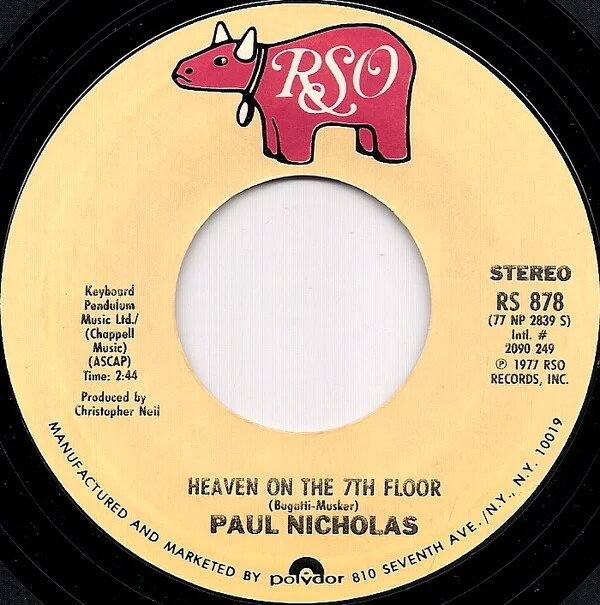
Was that when he left to go to America with his band Liar?
Sandy Davis: That is right, exactly right. We did ‘Back On My Feet Again’, that is one I can remember which I recorded I think 1975/1976, one of those years, probably early 75 but I am not sure. Maybe 74 maybe and he did some great vocals with me on that LP, and it was during that time and also after that time we started working as studio singers for other people. It was great and you know, had a lot of fun, really and it would have been about 77 around there he showed me the invitation to go to Los Angeles with Liar to make an LP over there which unfortunately didn’t turn out to be that commercial/successful, but you don’t know that before you make a record. You make a record because you know, that is what you want to do, and you want to do that. So, yes it was around that time and it was really sad. I do recall Paul saying to me well what do you think Sand? And I said well you know what this means don’t you? And he is doing well. I am aware of it. I said well, it is difficult to turn down an invitation to make a LP in LA, you know I understand that and Paul in your situation, I’d go. But you know, that will mean our relationship will end for the time until you get back and that is how that one actually ended. It was hard but you know.
Where did you go from there? Was that 77? Where did you go from there musically?
Sandy Davis: Well, I sort of hung around doing you know, doing the odd session here and the odd session there. Nobody turned up to replace Paul and I left fairly soon after that and went to Germany and that is where I stayed for many years. So, yeah that was the end of that.
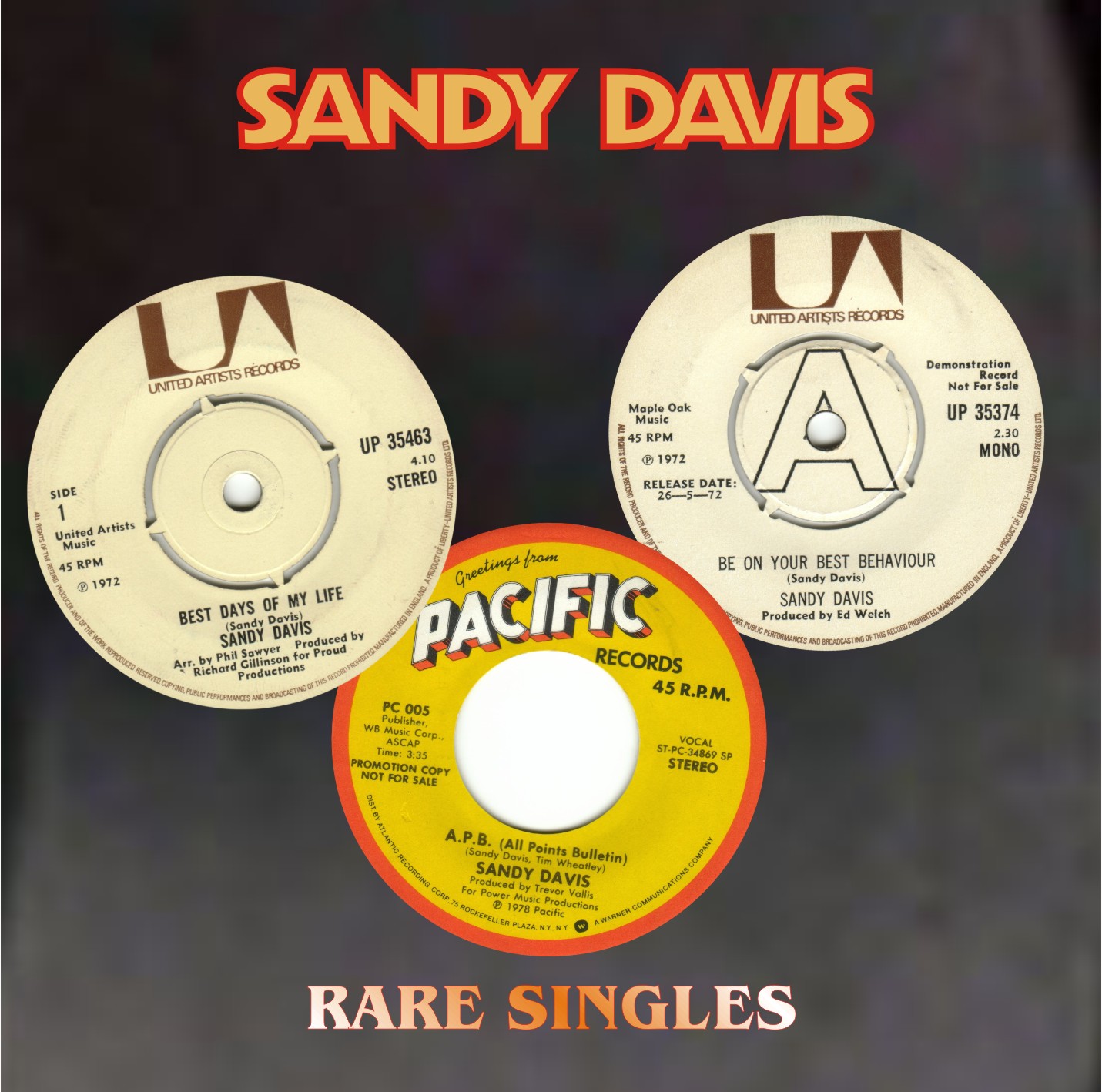
I forgot to ask this question, ‘Inside Every Fat Man’, you did ‘He Gives Us All His Love’, that is a cover and then on ‘Back On My Feet Again’, you did ‘Sweet Little Rock And Roller’, was this… were you told to do covers of songs cause I’ve seen other albums from EMI through that period where the artist has done one cover on an album. Were you told to do that or was that a personal choice?
Sandy Davis: Well, it was a bit of both really. We did ‘Back On My Feet Again’, ‘Only Love Can Last Forever’, was the title track with Average White Band then the band went over to LA and Robbie Mackintosh I think his name was, the drummer, accidental drug overdose over there and to replace the band because we had a recording contract in schedule, the producer that we were using Meyer Shagaloff. He organised some of the best studio musicians that were available, and we had so much fun making that album. It was just wild, you know but we ran out of tracks. I think ‘Sweet Little Rock And Roller’ is not the Chuck Berry song I wrote. I have to be honest here, I wasn’t aware of the Chuck Berry version, I hadn’t heard it but the press picked up on that, but I don’t regret it you know, it was seen to fit to the time. I am not sure now whether I would say it is one of my favourite tracks of the album, but you know, I wouldn’t even say it has served its purpose. It was fun to do, and you know, sort of fitted in really and on ‘Inside Every Fat Man’, the last one we did, is actually… I don’t know the name of the writer…Anyway, it was Andrew Jackman the arranger’s suggestion because we needed one more track and I hadn’t got any more songs that fitted the project at the time, so he suggested that one. Peter Skellern, I don’t know if you know, he has passed away unfortunately, he played piano on that and we sort of did it as a soul… it was a lovely song, Randy Newman, I think might have composed it, but I am not… don’t quote me on that.
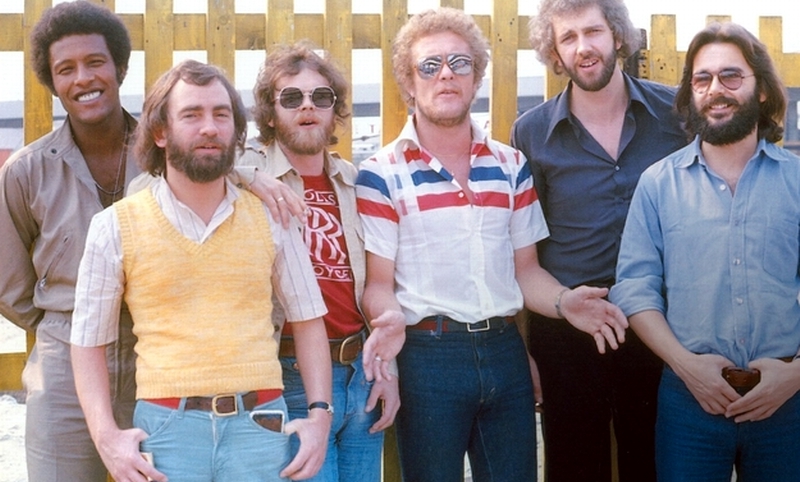
And about the shift in style of ‘Back On My Feet Again’, it’s a kind of pop-funk kind of sound. Was that put on with the new backing band and was it just kind of set and go and write all these songs to this new style?
Sandy Davis: Well, yes is the answer to that. I remember sort of, remember the producer Meyer Shagaloff coming down to my place and we were just sort of chilling and drinking a glass of wine, and he said, “well what songs do we have”. I said, “well I haven’t got any”. He said “what?! We go into the studio in 3 weeks, come on Sandy, get your act together man”. He had organised this contract with doing another LP and I said right okay, leave it to me then. Which is what he did, and I got down to writing all the songs and that is where the feeling of the album came from. It was, you know, wide open as an album and then you have got ‘Baby I Do’ which is basically a pop song, you know, it’s not… ‘Back On My Feet Again’ is kind of more of a musical statement, ‘Baby I Do’ and ‘Wild Woman’, that was more of a pop song… all these musicians were really great and one of my favourites is ‘Step In The Right Direction’. If you listen to that, right at the end the piano player is going right off the scale. It was just such a lot of fun to make, you know, we had a brilliant time making that whole album. But to get back to your original question about that ‘Sweet Little Rock ‘n’ Roller’, yes it doesn’t really sort of fit when I look at the list, but it did at the time, and it opened a side that ‘Only love can last forever’ was the first track that we recorded and that was with the “Average white band” which was such fun to made. That sort of set the spirit and tempo for this album. It was pretty great and lovely to work with musicians you know, instead of doing it all yourself you know.

Yeah, I would like to ask about the cover art for the ‘Back On My Feet Again’ because it is quite interesting. It’s you upside down on some kind of gymnasium thing like that.
Sandy Davis: That is… yeah okay you got it. Well, I was actually on a trapeze there and that is the way they took the photographs obviously trying to get the idea of ‘Back On My Feet Again’. It is not that far removed from someone on a trapeze, and you can turn it upside down. That is where that came from. Moreover, I don’t know, I was under the direction of the photographer and the art department, so I just went along with it and that’s what they came up with. My girlfriend at the time though wrote all the sleeve notes at the back bless her, in English and in italics. I remember that because rather than having it all typed up, I suggested to the record company and they said well that is a good idea and it looks really great so that’s you know, down to Debbie Rusting. Yeah.
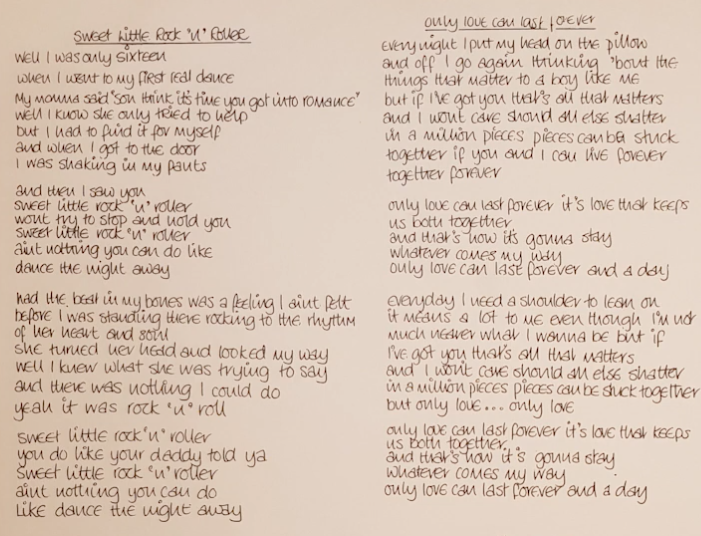
Was that a step up in budget for them too? I don’t know the logistics of it but for them to write lyrics on the album and sleeve notes because you didn’t have that for the first album?
Sandy Davis: That is right, it was a step up in budget. Well, I think it was, the times demanded that you got one album passed and didn’t have any comments and you know that fitted in with that, and it’s a new album so, we will put some sleeve notes on because that is kind of how that happened, and it wasn’t a problem as we had a lot of stories to tell. I am not quite sure what was actually said on that album, but I think we printed the words, were they on the inside?
Yeah, they were on the inside.
Sandy Davis: Yeah, we put the words on, yeah there you go. Yeah, that was my idea, I thought it wasn’t an original idea, but I thought a lot of people were doing that and I thought it would be really cool and the record company said yeah okay, we will do it.
Did you do any live tv shows or any just live shows to promote the first 2 albums?
Sandy Davis: I don’t have recollection of any big live tv shows. They were very hard to come by and still are. You know, you have to have the right connections to get into television. It is not a guarantee of selling any albums, you will sell a few more of course but it is not a guarantee of anything, and it is very very difficult, we didn’t get that far I am afraid I have to say which is a pity.
Did you plan to release a 3rd solo album, or did it evolve sort of into the Roobarb album with Paul Travis?
Sandy Davis: That was one of our things that we managed to do before Paul left for America was ‘Roobarb’. We were getting there but as I said, Paul left and you know, it was at an untimely point but a timely point for him and yeah things were just… yeah, just grooving along and it sort of fell apart. You know, I went off to Germany to do my thing and Paul went off to America to do his. I mean, we got back together later but, that’s kind of how that played out if you might.
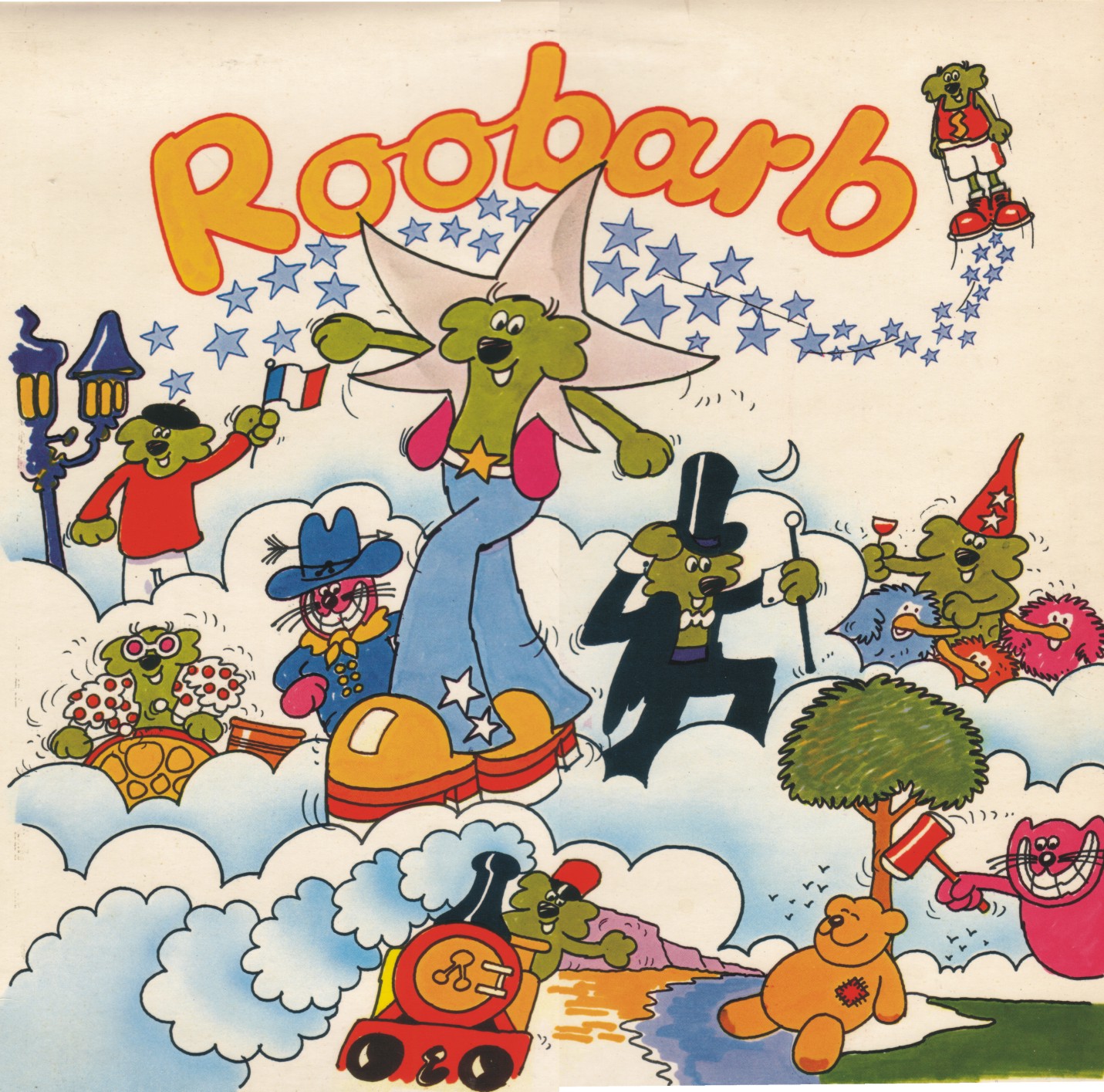
Can you tell me a little bit about the ‘Roobarb’ album? How did you eventually come to making it because I wouldn’t say it is too far from your side of music, but it is a jump from doing 2 solo albums to doing a sort of tv kids show album, you know what I mean?
Sandy Davis: That’s right, you know like the magic roundabout or something, Roobarb and Custard was an animation that my manager Johnny Sterling heard and got wind of, that they needed an LP. It was like the Wombles if you like from… ‘the Wombles of Wimbledon’, that was the song and the Wombles would do about 15-20 minutes or something before the news, that is how it was then and Roobarb was the ITV version of that, Roobarb and Custard. The animations were really sweet, and Johnny managed to get them to commit to an LP to sell our record, but it didn’t have any songs and it didn’t have much of a budget. Just Paul and I, and also the recording engineer Trevor Vallis, he engineered the whole lot, not ‘Inside Every Fat Man’ but ‘Back On My Feet Again’. Yeah, he played bass, Trevor played bass and we just wrote the songs, you know ‘Roobarb’, obviously Roobarb and Custard, Monsieur Roobarb because he was in Paris, you know that kind of stuff. ‘Roobarbs A Star’, ‘Hey Mrs Moonlight’, ‘Going To The Seaside’, ‘Doo Dah Roobarb’, ‘Cowardly Cowardly Custard’ , that one is quite funny. ‘Monsieur Roobarb’, ‘Custard’s Last Stand’, ‘Roobarb’s Party’, and ‘Go to Sleep My Teddy Bear’. That was another song that was put in there because we ran out of tunes. It was that simple. We just made it all ourselves, we just played the instruments ourselves and wrote it all ourselves and that is how that came to be, but it didn’t take off unfortunately.
How did you find coming back to drums? Was it kind of a chore coming back to drums or did you like doing drums?
Sandy Davis: Oh, I loved it, yeah, I loved it. I sort of felt you know, here’s a drum fill and there shouldn’t be one and I would just do that always looking at Trevor. It was funny in the studio, the mixing desk, the mixing room, the control room and then there would be a vocal booth, the main recording room for all the pianos and songs were through a camera so you could see it but the vocal booth was straight in front of the desk, and I had my drums set up in there so I would always finish of playing the drums and I would always look at Trevor, and if he went like that it was good. If it went like that, it meant do another one, and mostly it went like that, you know. It was just like a fuel thing, I just felt you know, here I am just going to play it you know as I feel it and it mostly works. We are song writers you know, and you kind of know what you feel.
And you kind of, you sang on more tracks of the album than Travis, I think he only really sang on go to sleep my teddy bear, I think I might be wrong. Did you play all the keyboards and all of the guitars on the album?
Sandy Davis: We played everything, yes, and Trevor being the recording engineer/producer really, you know was great at dropping in and dropping out if you made a bumble on part number 25 or 26 or something you know. He was brilliant at that, just go back and drop in and repeat that and so on and so forth. So no, we played all the instruments, well I played a lot actually. Yeah, I didn’t know actually how many I had sung, just sort of whoever was there, I mean we were all there but whoever felt like singing it I guess would be me.
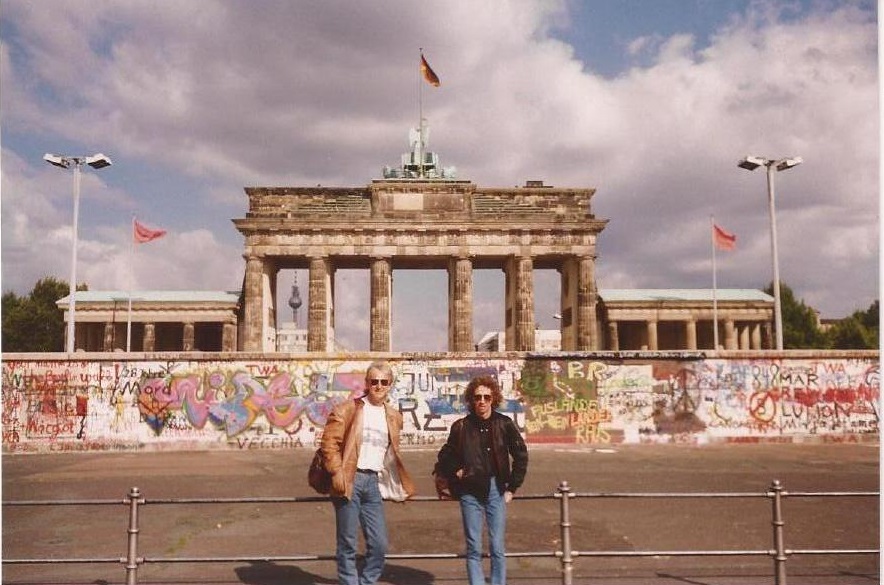
And back to writing for that album. Did you sit down and just watch hours and hours of this tv show or was it… did you just have all these ideas ready?
Sandy Davis: Just had all these ideas. We just sort of saw a couple of cartoons and just got the idea of the characters, you know Roobarb being the dog I think, Custard was the cat or something like that. I think it was a cat and a dog or something like that, and we just watched the cartoon a couple of times. Thought it was great, loved it, great for kids and I have always been a softy, you know I love kids. So, we just wrote as we felt it, we thought obviously you’ve got ‘Cowardly Cowardly Custard’, you know it’s an obvious one isn’t it and ‘Custard’s Last Stand’ was another obvious one, custard’s last stand. You know, these are sort of titles of the time for Roobarbs apparently, ‘Doo Dah Roobarb’, ‘Going To The Seaside’, ‘Roobarbs A Star’, yeah, just obvious titles at the time.
And how did it feel to be playing drums again for the band “Headwaiter”, especially with 2 drum kits because it’s a very unusual set up?
Sandy Davis: Yeah, well, I think it was an unusual set up wasn’t it but how it turned out was that, Doug Ferguson and not Andy Latimer he was there in the background but he only occasionally came to rehearsals. Tim Wheatley, and Doug Ferguson and Sev Lewkowicz I think, we were all kind of you know, practicing in Tim’s studio and I was playing drums. There are limitations you know, I mean I can play drums on, you know, Roobarb’s party or something but I wouldn’t be able to do it as professionally as perhaps the others you know and Headwaiter was a band whose music was quite complex. Not necessarily over complex but it was, it was quite complex and that is why we had a second drummer, cause I was doing a lot of singing you know, me and Tommy I think was his name…
Jimmy Kean was in the band.
Sandy Davis: Jimmy! Yeah, great singer, he had a super voice, I hope he is doing okay, and Jim was doing the lead vocals, I was doing a lot of back up vocals and messing around with keyboards here and so you know I was splitting my attention between a lot of instruments and you know, that was the main reason why Headwaiter decided on a second drummer who had to be available, I think his name was Greg, he had to be available. Yeah, and he wanted to as well, we all wanted him and that is how that happened you know. It was a lot of fun.
Did this remind you of your early band days with Gracious! Or something maybe like Satan’s Disciples?
Sandy Davis: Oh yeah, yes it did. It was a lot of fun; I remember Tony Leach on the piano there. Alright Sand? It was a lot of fun I must say, they were fun days.
How did you find writing with… Tony Leach was obviously the writer of the band but so was Doug Ferguson which is a bit unusual because the 2 other members of the band that I spoke with, don’t really remember Doug writing anything?
Sandy Davis: No, I think that was sort of, in those kinds of situations that were often token pieces you know, Frank Farian for example and another you know, he would write a word or 2 and then be credited as part writer. I am not saying that was always the case with Doug, because he was mainly on his instrument, you know bass wasn’t it?
Yeah.
Sandy Davis: Bass yeah and was really good. He was sort of keeping the band together and it was after all of his calling Headwaiter sort of split from Camel. So, yeah, I mean Doug did contribute to the writing, but not an awful lot. I think what he did with it, Tony Leach and I wouldn’t have necessarily been around for those writing sessions. I would have just written something… I can’t remember what I did write but I just would put it to the band like hey what do you think about this? And blah, de blah de blah or whatever. Yeah that’s good, we can put it in somewhere and that is how it was with them you know. It was a lot of fun I have to say. Great fun.
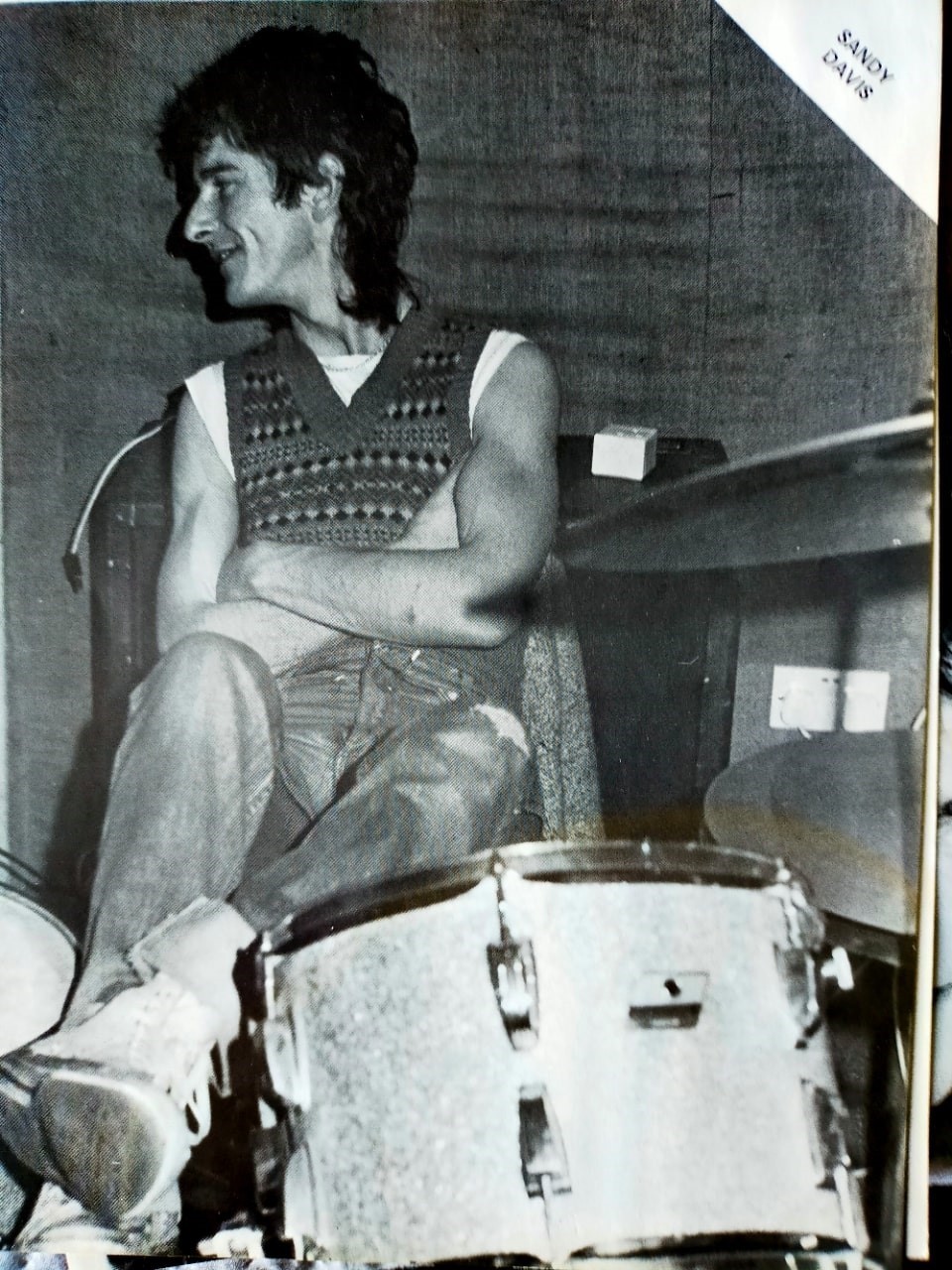
Do you remember why the band split up?
Sandy Davis: I don’t, I think it was, it probably was money, it often is for these projects. Unless you are completely and utterly sold down the river with your art, we would end up sleeping on the streets for it, then you would probably have to, you know, find money from somewhere and if it was not forthcoming with the band then you probably have to change. I think that may have been a reason but don’t quote me on that. I don’t really recall but we did try our best, you know, to get as many gigs as we could, and we did succeed in that respect, but I suspect that is probably why the band broke up. I am not sure.
Yeah, that is fine. But in the early 80s you moved to Germany. What kind of work did you do over there and what was the decision behind Germany?
Sandy Davis: Well, I just wanted a change you know, I just wanted to… I had a good 10 years, all through the 70s I was around, this that and the other, it was great fun. But I just wanted a change, and I had an invitation to work in Munich in the studio owned by Frank Farian who needed some lyrics and background singing which is what I came from as well, so that is how that happened… But that is another story but that is what I did, and I don’t regret that at all. It was a great experience and I ended up staying a long time in Germany and I made a lot of friends and that was nice to get away from… I don’t know where I was. It was just how I felt.
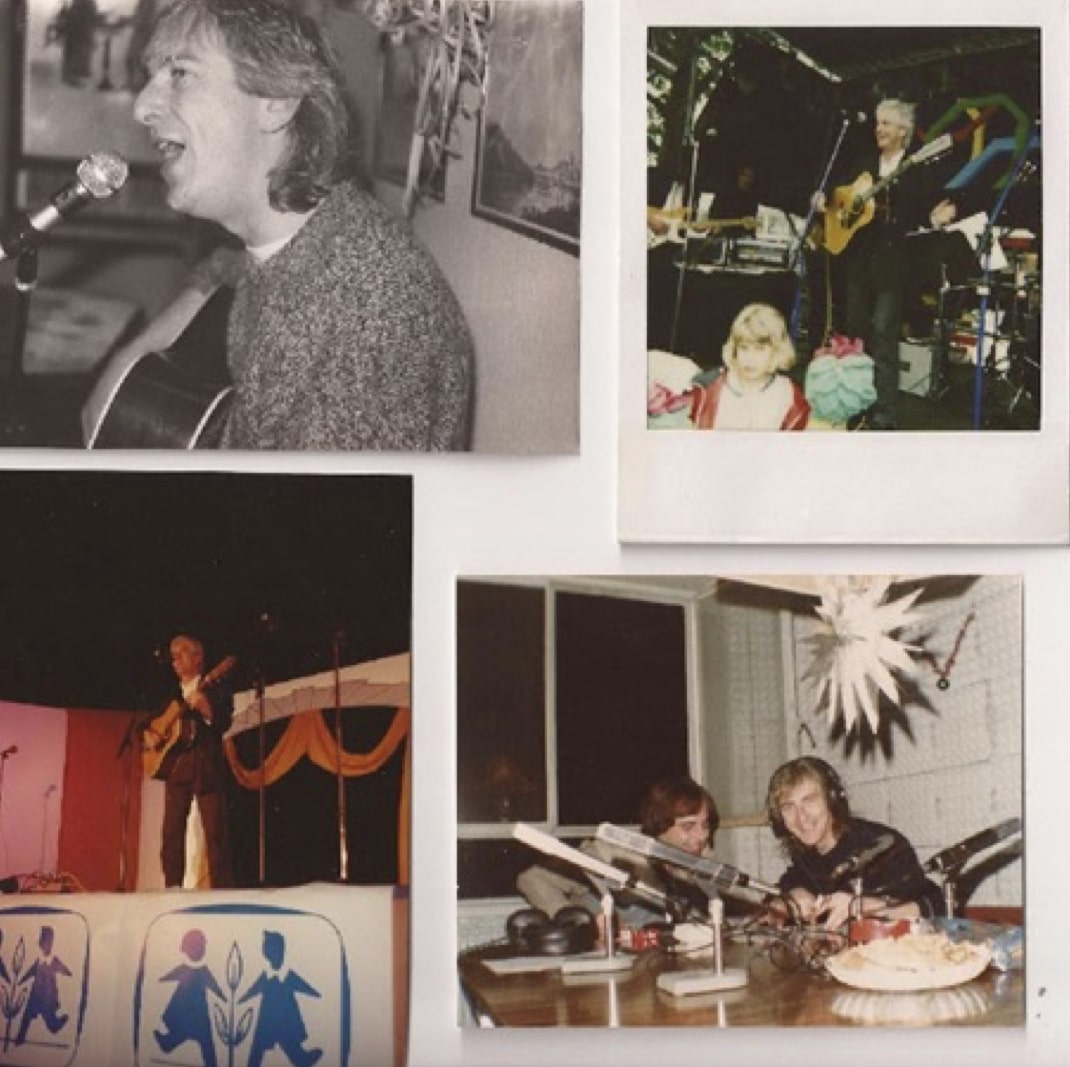
Seen a lot of pictures with you and your 12-string acoustic guitar, as far back as the Gracious Isle of Wight festival on YouTube. Is this the same guitar all these years and why did you choose a 12-string guitar?
Sandy Davis: Good question, I chose the 12-string guitar because it had 6 more strings. Yeah, kind of along those lines and when it was in tune, you know obviously a guitar when it is in tune is better than a guitar when it is out of tune, but it had a special sort of clang, a special sort of sound. The electric 12-string has a special sound, the birds for example, they introduced it to pop music I think and then the Beatles took it up with if I need someone, they made it really world famous and the acoustic 12-string is just such a lovely sound. It is such a full sound when it is correctly tuned and ours used to have it… the capo on the 3rd fret because for the action you really had to press the strings hard to get it to the fretboard, so I put the capo on the 3rd fret and turned it one and a half tones down. It wasn’t hard to do as soon as you got the hang of it. So, when I played a B-major chord, it was B-majoron the piano. But yeah, I just liked the sound, I really did.
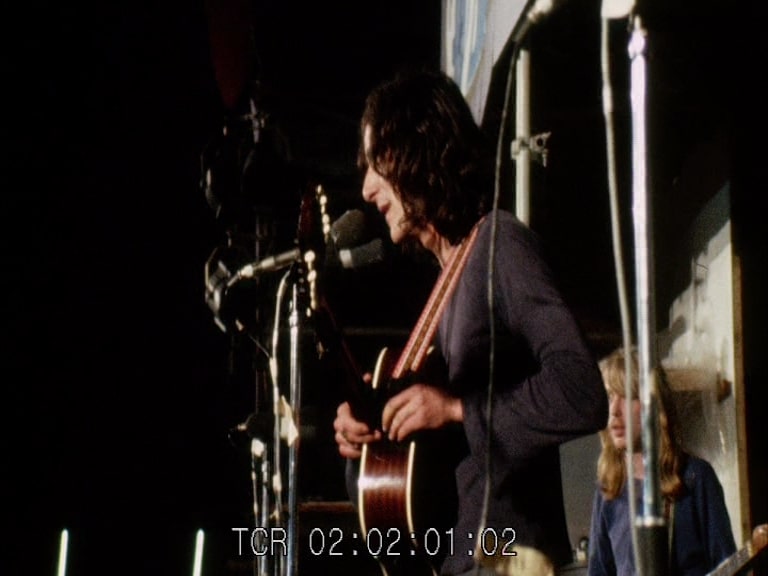
I was going to ask you about the capo because of that footage on YouTube that I have seen, you have a capo on yeah, the 3rd fret and I was wondering whether you were using a different tuning or something, or was it…?
Sandy Davis: No, in those days, I hadn’t gotten that far. I had the capo on because, whatever key it was, I would be playing… I wouldn’t be playing difficult chord strengths of the class cause that is another thing, that is not that easy. So, I would transpose like if the thing happened to be in G-flat, or even better… I don’t know A-flat, then I would put the capo on the 4th fret and then I would play or move it down and then play a chord of A-flat. Whatever, you know, I would use the capo to transpose the key so it was playable on the guitar. That is why you see me with the capo on it, not all the time but most and for some of the time anyway at least. What was the song… meet the maker or something? Be prepared to meet the maker? I think that might have been one of them that Martin had used the chords and open… I can’t remember the keys but it definitely was something like E-flat and I don’t want to be playing something like an E-flat on a 12-string guitar, you know that is no fun when playing it live so I would use the capo to transpose it to a key that was easier to play as that.
And did you always use a 12-string throughout your career, or did you use a 6-string for the most part and things?
Sandy Davis: No, mostly 12-string and I don’t know how many years I did in ways that feature a 12-string. You know there are plenty of songs that are well known for their intros and you know, it would be a 12-string guitar. It wasn’t always but I sort of, stayed with the guitar because it was comfortable for me, the neck wasn’t too wide, and it wasn’t too hard. As I said with the capo, it wasn’t too hard to press all the strings together to get the sound you know and using the open chords of G-major and C, you know you have got A-minor 7th and you’ve got D, pop songs are really very simple basically. They are made to seem complicated, but they are not really and yeah that is how it came about and I really loved the sound of the 12-string, so I stayed with that.
And as of the Gracious 1996 album, were you told about that? Or were you aware of that being made cause I know you were in Germany at that time but, were you spoken with about even making the album?
Sandy Davis: No, it wasn’t mentioned to me. As far as I know, I can’t remember having had this talk, but I was in Germany and the guys probably just wanted to get in the studio then quite quickly there was enough material, I guess to do that and get me over from Germany would have been more than it was worth you know. Not financially but from time and convenience and that kind of stuff so that would be the answer to that, but you would have to ask Alan Cowderoy about that. I don’t know.
Do you remember, because 4 of the tracks in that album are spring, summer, autumn and winter and I heard that was actually one of you and Martin’s original concepts for Gracious! Can you tell me a little bit about that?
Sandy Davis: The four seasons, yes well that is not a new thing is it. Well, one of them is classical composers… the four seasons. Yeah, we even played it live at the marquee club. We wrote the music; I can’t remember much of it to be honest these days, but we loved it. We loved the idea and the simplicity of it of course and somebody says write me something that sounds summery you know, or wintery, I mean you write cold sequences and something that conjures up, you know a temperature drop, a really really great thing to do. It is a challenge I think, and I have forgotten what the actual question was again sorry.
It was just if you remember writing the four seasons…
Sandy: I remember we did a lot of rehearsing, oh yeah, I remember them now. We did a lot of rehearsing for the four seasons and we even did it at the marquee club live. I remember that and I remember for the first time, using a music stand because you know, I never did use music stands ever and I always sort of thought it was you know, cheating like music is up here. I have got it right, I have got it wrong, let’s put it that way. Plenty of people these days, professionals, use music stands and why shouldn’t they. It is perfectly legitimate, they do classical music, they have always done it in classical music so why not in pop music. I recalled this evening where I had this music stand cause I didn’t really use one very much at all actually, the music that we had, the notes cause that is all it was cause I can’t read music, but it kept falling off onto the stage, I had to keep picking it up and you know, but it was a great help actually to be honest. There was a lot of music. You are looking at, at least an hour, 15 minutes ago. The four seasons, you are doing about an hour, and so it is quite a lot to remember, you know. We were young but yeah, we rehearsed that a lot. That was one of our favourites, but it didn’t make it on to record the early stuff. I don’t know why that is or why that was, there was a reason for it but I can’t think of it at the moment.
Was that you playing drums at the marquee club or was that you singing?
Sandy Davis: Singing.
Singing? And you mentioned the marquee club, you did a reunion in 1972 for Gracious? Was that right? Do you remember that?
Sandy Davis: It could be, I don’t, no I don’t.
Alright, Robert Lipton was talking about that and saying how he felt he deeply regretted leaving the band after playing and that he deeply missed it and all that.
Sandy Davis: Yeah, well Robert leaving was of course the end of the band. I can’t say Robert was at fault, but the drummer holds the band together and this kind of band you know, you take the drums out, you are not sure where you are. The drum is the anchor and Rob was such a great drummer. It was such a pity. I understood why he left, it wasn’t as if he turned and said listen guys, I am fed up with music, I want to do something else, I want to start up, you know a dance band or something, it wasn’t like that at all. It was another reason, a private reason but yeah, I remember him going and he was very sad about it, but it was family pressure and those kinds of things at that age. You know, you are not in a position to really turn it down as indeed he wasn’t so, yeah. It wasn’t too much about the reunion, but if it was 72, I definitely was around. But I do have holes in my memory as you probably know.
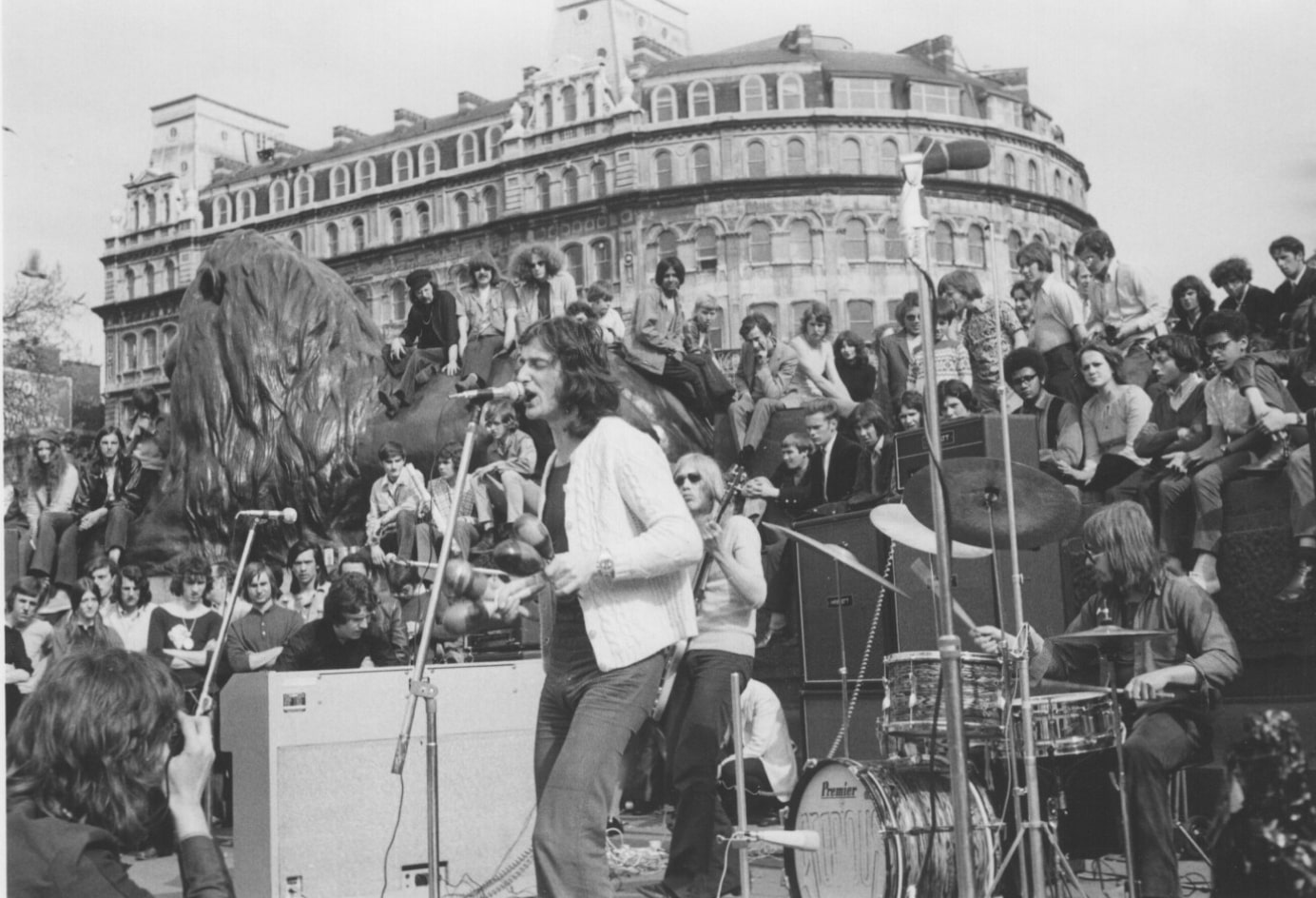
Do you remember when Martin left? Was that sort of awkward?
Sandy Davis: Very.
Was that a major downset for the band?
Sandy Davis: Yes, it was. I took over the keyboard, but you know, I couldn’t compete with Martin, he did classical pieces, you know I am not classical trained. So, yes it was. It was a major catastrophe when he left. He left I think soon after Rob left. Rob left for personal reasons and then Martin said well I guess I had enough too because the drummer that we had got, was not really fitting in with the band. I am not going to say anymore. I really liked him; he was a really nice bloke, but the styles didn’t fit. So, you know, that kind of prompted Martin to say okay I have had enough I am going to move on from here and yeah, that sort of stopped. It was the end of the band.
Massive thanks to Sandy Davis for taking his time to chat with me and sending all the pictures.
Joe Smith
Sandy Davis Facebook

